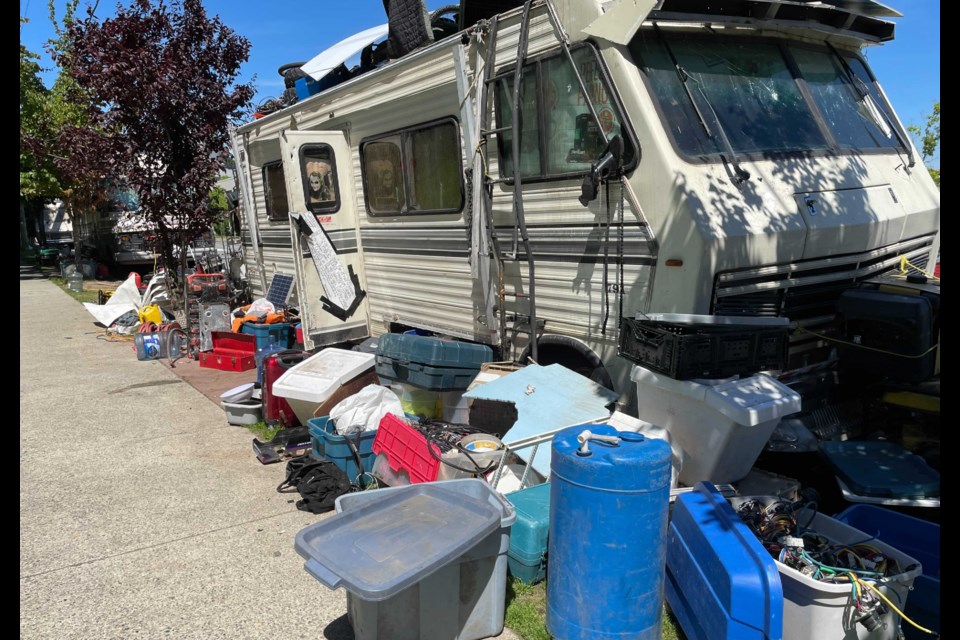More than a week after the City told them they'd have to move a group of people living in RVs along Slocan Street are still there.
One of the people living there, who goes by CC, has been a resident on the stretch of road since January 2020 after a series of events that started with a fire in the house she and a roommate had a suite in. Now she's living in a 35 ft. RV on Slocan between East Broadway and Grandview Highway.
In May the city gave notice that CC and others who are living in RVs along the street would have to be gone by the end of the month. While some have moved, around eight remained.
For CC and others, they have nowhere to go with their mobile homes, she says.
"There are no RV parks that take vehicles that are (more than 20 years old)," she tells Vancouver Is Awesome. Her current home is a 35-foot RV that was built in 1985.
The group she's a part of all own and insure their RVs. One idea they're fighting against is the idea that they're homeless.
"We're not actually homeless," she says. "The definition of a home is a roof and facilities."
City bylaws don't allow for RVs to be parked on streets, though that hasn't been enforced in some areas. CC says she's gotten a couple of tickets over her time there, but she hasn't been forced to move — bylaw officers were empathetic while ticketing. She knows of a few places where RV communities have popped up in Vancouver but adds that all have received notices from the City; she also claims there are inconsistencies with the notices from it.
"Is it because we live in them? Because that's not what they're saying. They say we're overheight and we're parking overnight," she says, adding commercial vehicles use the area too and are overheight; CC points to the fact UHaul trucks are often left overnight on the street, breaking the same rules. As far as sleeping in vehicles, she adds, there are people sleeping in smaller vehicles that are less conspicuous.
"We're being criminalized because we're not in the mainstream," she says, adding that because they don't live in a building she thinks people think how they're living is wrong.
One issue is that not all RVs along the stretch of road are insured and owned by the people living in them. Some were abandoned and left uninsured for squatters to move into. CC blames them for bringing attention to the area through garbage.
"We were trying to live under the radar and the debris they were bringing was definitely spotlighting the area," she says.
The City has cited garbage and human excrement as reasons to move everyone off of Slocan, but CC says other groups, like the squatters, are responsible for the mess, adding her group cleans up around the area and collects garbage into a pile when they know the city is coming.
However, the mess has garnered concerns as Vancouver Technical School is nearby, with its fields bordering the area where the RVs park. The street also has a Lowe's Home Improvement store, church, and outreach centre.
And while some in the area have complained (CC notes a nearby church has raised issues) others living in the area have vocalized their support of the group. More than 20 members of the nearby Kaslo Gardens Housing Coop signed a letter, including Grand Chief Stewart Phillip.
"If anything, cracking down will only increase the number of homeless people in our city. There are short-term fixes available - don't want garbage? Provide a dumpster. Don't want waste? Provide port-a-potties. Don't want campers by a school?" states part of the letter. "Let RVs park elsewhere."
Taryn Scollard, the City's deputy general manager of engineering, says the city is helping the group move, even offering to tow those who don't have power.
"We're trying to provide a lot of different options for people to self-select," she says.
Transportation, though, isn't the issue; CC says people are willing to move, but none of the options from the city include a location to move to, in Vancouver or nearby. Scollard notes that Vancouver's bylaws are in line with other nearby municipalities.
"What we're looking for is somewhere where we can park and not be harassed by the city," CC says.
Another option from the city would see items put in storage for a month while people find new housing, but CC notes that would make the person homeless while looking for a new home, and then they'd have to pay for rent and storage of an RV. While CC works, she says others are seniors without significant income.
She hopes there can be support for another idea, that would allow them to remain in Vancouver. One potential plan would be for the people living in RVs that are spread out to be allowed to all park in one parking lot, where a community could be organized.
"Put us there for a year as a trial basis," she says. "Let it be run like a co-op."


.jpg;w=120;h=80;mode=crop)
